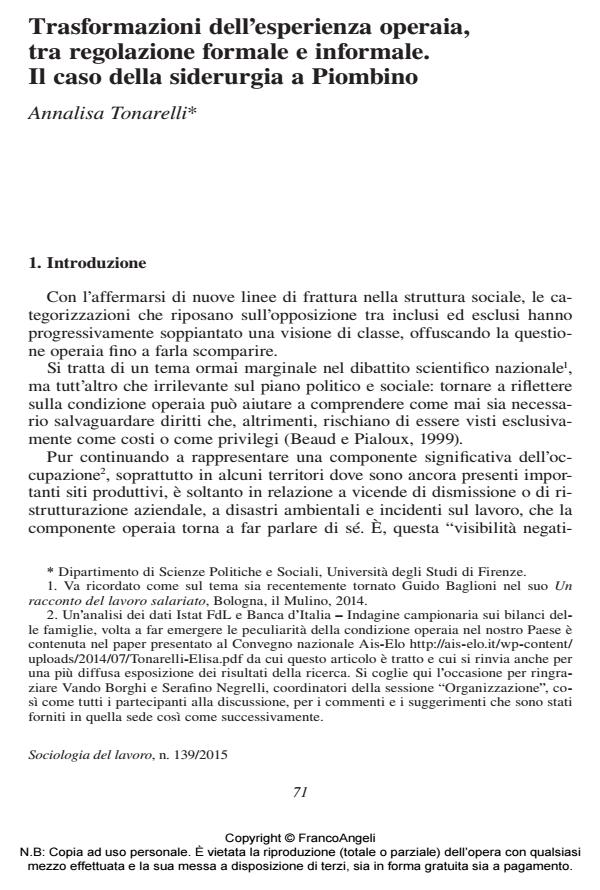Transformations of working experience between formal and informal regulation. The case of the steel industry in Piombino
Journal title SOCIOLOGIA DEL LAVORO
Author/s Annalisa Tonarelli
Publishing Year 2015 Issue 2015/139 Language Italian
Pages 11 P. 71-81 File size 86 KB
DOI 10.3280/SL2015-139006
DOI is like a bar code for intellectual property: to have more infomation
click here
Below, you can see the article first page
If you want to buy this article in PDF format, you can do it, following the instructions to buy download credits

FrancoAngeli is member of Publishers International Linking Association, Inc (PILA), a not-for-profit association which run the CrossRef service enabling links to and from online scholarly content.
This article focuses on the contents and transformations that, with the crisis of the industrial system, have characterized the working class, its constitutive rules, behaviors and social practices of blue-collar workers in and out of the factory. The analysis is based on a longitudinal survey that has touched several aspects of the process of de-industrialization that has affected Piombino, one of the main Italian steel areas. The study here proposed is based biographical interviews, realized among three different groups of steel workers selected according to the period in which they were hired into the factory.
Keywords: Working class, working and living conditions, economic and social regulation of work, steel industry, Piombino
- Accornero A. (2009). Il lavoro che cambia dopo la classe. Quaderni di Rassegna Sindacale, 1: 7-26.
- Beaud S., Pialoux M. (1999). Retour sur la condition ouvrière. Enquete aux usines Peugeot de Sochaux-Montbéliard. Paris: Fayard.
- Bonazzi G. (1964). Alienazione e anomia nella grande industria. Milano: Edizioni Avanti.
- Borghi V. (2014). La tecnica al lavoro. Dominio e democrazia nella messa in forma del reale. Parolechiave, 51: 69-90. DOI: 10.7377/7767
- Carrieri M., Damiano C., Ugolini B., a cura di (2005). Il lavoro che cambia. La più vasta ricerca sui lavoratori italiani. Roma: Ediesse.
- Chiarello F., Greco L. (2014). La privatizzazione della regolazione: l’ILVA di Taranto. Sociologia del lavoro, 135: 37-54. DOI: 10.3280/SL2014-13500
- Dubet F. (1994), Sociologie de l’expérience. Paris: Seuil.
- Goldthorpe J.H., Lockwood D., Bechofer F., Platt J. (1968). The Affluent Worker: Industrial Attitudes and Behaviour, Cambridge: Cambridge University Press.
- Negrelli S. (1991). La società dentro l’impresa. Milano: FrancoAngeli.
- Negrelli S., Pichierri A. (2010). Imprese globali, attori locali. Strategie di anticipazione e governance dei processi di ristrutturazione economica. Milano: FrancoAngeli.
- Piselli F., Ramella F., a cura di (2008). Patti sociali per lo sviluppo. Roma: Donzelli.
- Regini M. (1991). Confini mobili. La costruzione dell’economia tra politica e società. Bologna: il Mulino.
- Tonarelli A. (2004). “Industrial decline and Local Development Policies in the Steel Area of Piombino”. In: Crouch C., Le Galès P., Trigilia C., Voelzkow H., eds., Changing Governance of Local Economies, Oxford: Oxford University Press.
- Una deindustrializzazione morbida? Politica, sindacato e coesione sociale a Piombino Samuel Boscarello, in ITALIA CONTEMPORANEA 295/2021 pp.68
DOI: 10.3280/IC2021-295003
Annalisa Tonarelli, Trasformazioni dell’esperienza operaia, tra regolazione formale e informale. Il caso della siderurgia a Piombino in "SOCIOLOGIA DEL LAVORO " 139/2015, pp 71-81, DOI: 10.3280/SL2015-139006